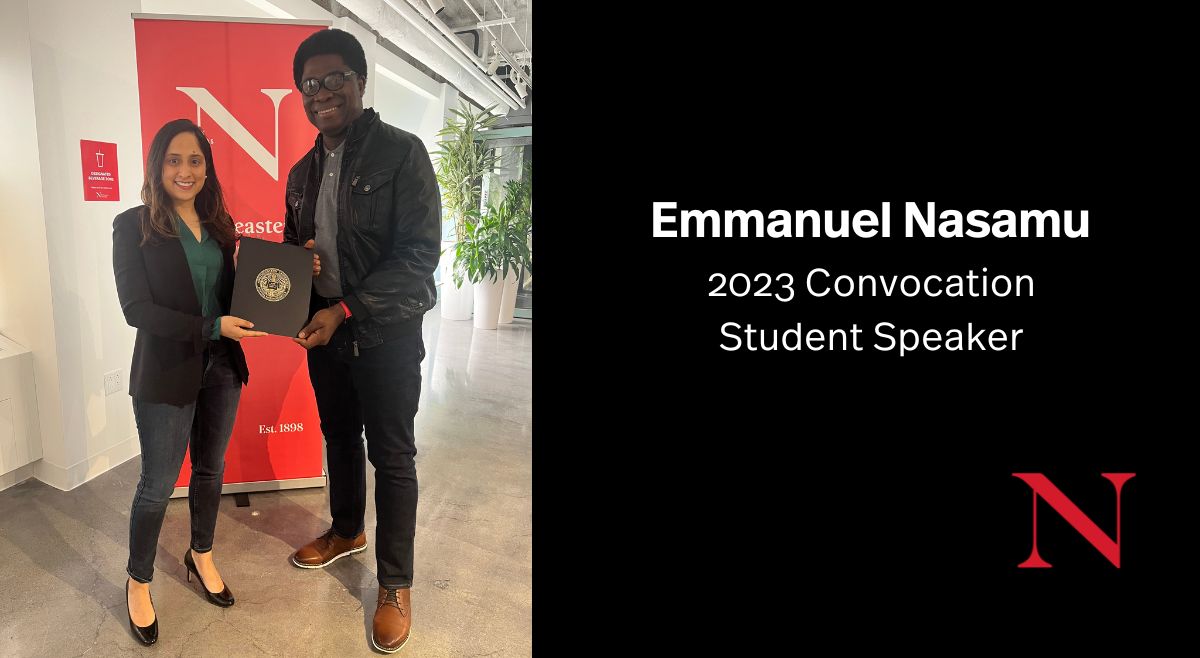Five Questions with Emmanuel Nasamu

Emmanuel Nasamu enrolled in Northeastern University in Toronto with a goal to reinvent himself. In the process, the IT professional, and Master’s in Professional Studies in Analytics student, has inspired others to become the best versions of themselves. Emmanuel has dedicated himself to giving back to the Northeastern community and playing a leadership role in student life on campus.
His involvement spans several initiatives. Emmanuel participated in the campus’s Global Village events — where students gather to learn about each other’s cultures as well as diversity in Canada — and founded a Student Interest Group for African learners. He is also actively involved in peer mentoring, roundtable and panel discussions, and the Graduate Leadership Institute, a credential offered by the College of Professional Studies with the aim of empowering graduate students to network and build community across industries while enhancing their proficiency in global leadership competencies. Beyond the campus, Emmanuel volunteered with Habitat for Humanity and NIPCA Immigrant Centre, a non-profit that supports Black IT professionals. , a non-profit that supports Black IT professionals.
Now, his efforts are being recognized. Not only has Emmanuel received the Outstanding Graduate Student Award in Leadership, but will also be the student speaker for Northeastern University in Toronto June 2 convocation ceremony.
The award you received, in part, focuses on leadership. What is your definition of a leader?
In leadership, there is always a cost, whether it’s time or money, for something that you are trying to achieve. What is most important for me as a leader is, how do you get people interested in going on that journey with you? So, a successful leader is someone who is able to inspire others to go on that journey with them.
A leader is also someone that is able to build a legacy of true success, which means you are successful and you are able to replicate that success in the team that is working with you. Additionally, it means first being able to lead yourself by holding yourself accountable, inspiring yourself, motivating yourself, practicing self-discipline. These are the tools you will need when leading others.
What made you want to get involved in student life at Northeastern University in Toronto?
With the Graduate Leadership Institute, for example, I was involved because I really wanted to find true meaning to what leadership was about. I also wanted to connect to the global campus network. Until today, it remains the best opportunity I’ve had to connect with students from Boston, San Francisco, and across the global campuses. For the extracurricular activities I’ve been involved in, I saw them as an opportunity to give back my time, my intellect, my expertise, and my experience.
What did you learn about leadership from your involvement at Northeastern?
In the Graduate Leadership Institute’s courses, I was able to clearly understand my strengths. It is very important, for leadership, to value your identity and know that you are unique. I’ve also been able to hone my insightfulness because understanding my strengths helps me to know where exactly to look for opportunities to apply it.
Moving on from there was the opportunity I then had to be a peer mentor. It was really an exciting journey mentoring other graduate students and helping them to navigate school and coming to understand what purpose really means. I had been involved in mentorship programming in the corporate world for a long time, but never really found the kind of fulfillment I found mentoring graduate students.
Last winter, one of my mentees became a mentor. When I asked her why she decided to become a mentor, she mentioned she was truly inspired by the work we did together. For me, that really caps all of the work I had put in. I never expected I would inspire someone to that extent. In that moment, I was able to learn that you don’t need to think about being rewarded or recognized publicly to find purpose. I found purpose in being able to help others to navigate based on my experiences.
What do you think is the biggest benefit, for students, of getting involved in campus life?
Getting involved allows you to go beyond the academics to develop the traits that you need to truly survive, and thrive, in the workplace. What makes you more corporate-smart or more well-rounded is having that involvement in both academic and extracurricular activities. It helps you strengthen your ability to communicate. It helps to make you more courageous, which is something you need. It helps to make you more confident. Being involved on campus also allows you to make mistakes in these areas when the repercussions are not as heavy as in the workplace. It’s like a test ground.
You’ll be giving your graduating class’s convocation speech. What did you take away from being chosen for this memorable moment?
It was truly humbling for me. I do not believe I am the most eloquent, but I do think it’s a culmination of all those experiences we talked about. Involvement puts you out there and people are able to get to know you. So, when you do put up your hand for opportunities, if you are qualified, they don’t second guess. I feel truly honoured and I feel very good that Northeastern found me worthy of this honour. I truly, truly hope that this will be a speech that everyone listening will forever remember.




